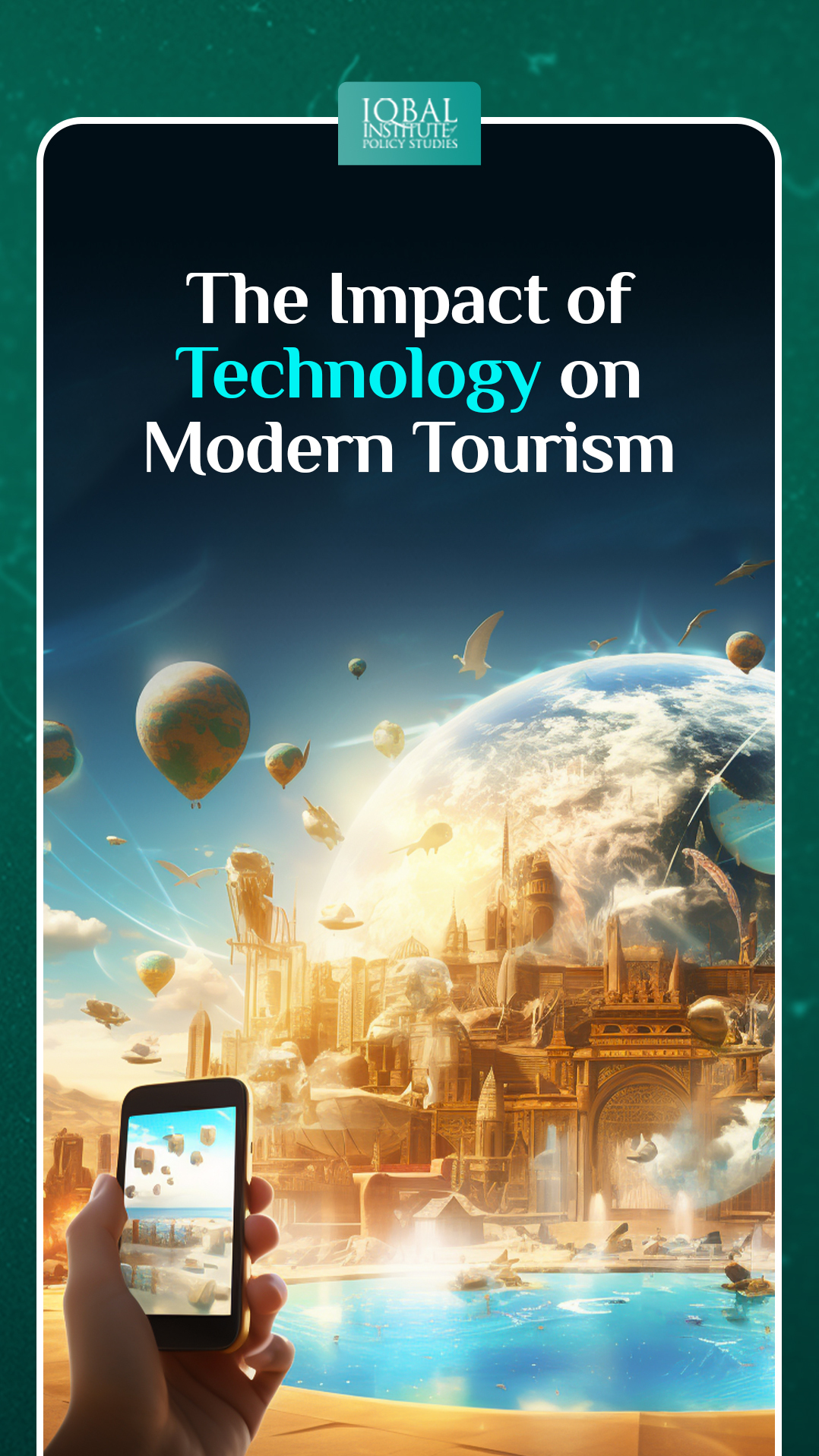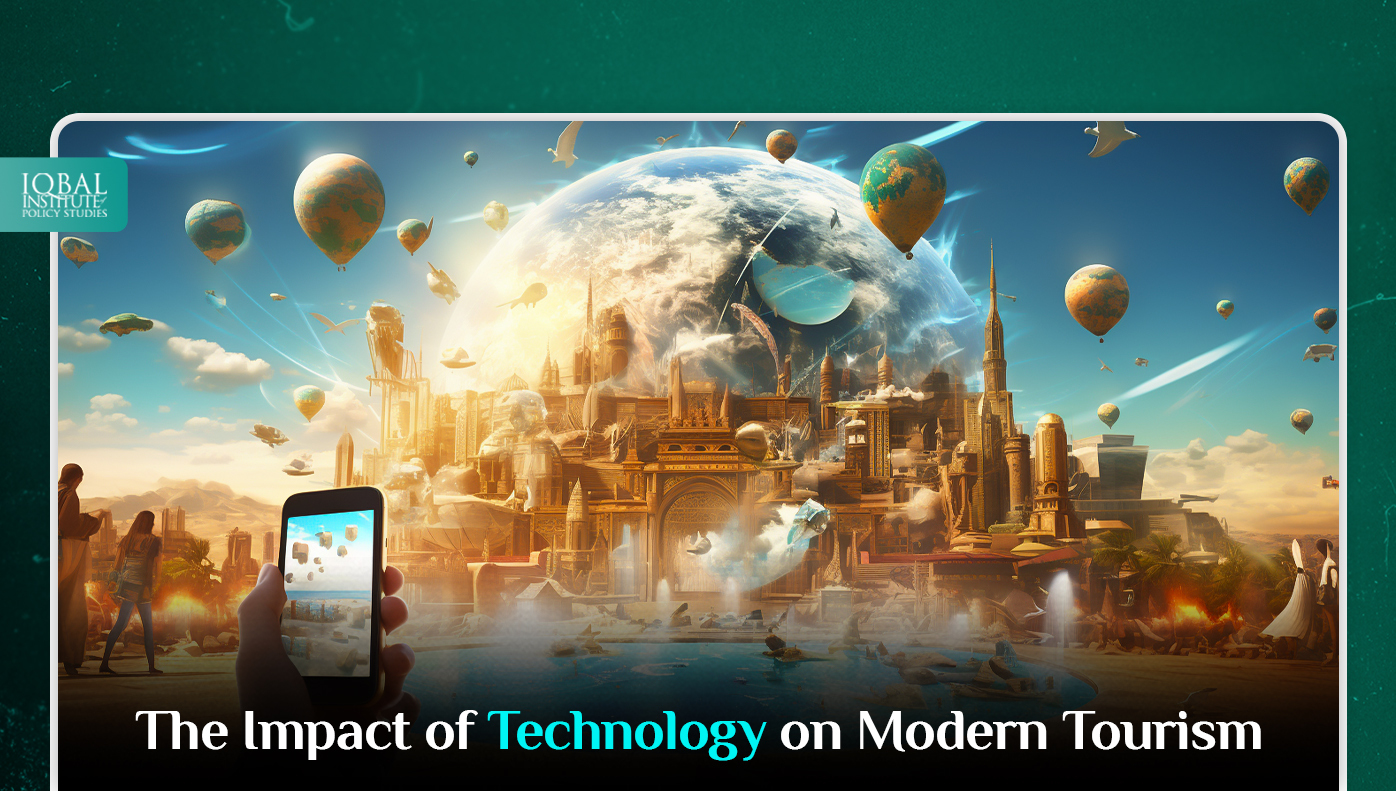Technological developments have changed the way people travel. The intersection of technology and modern tourism has sparked a dynamic shift in how travelers plan, navigate, and engage with destinations worldwide. From the initial stages of inspiration and research to the journey itself and sharing memories afterward, technology has woven a thread that connects every aspect of modern tourism. Moreover, this fusion has unlocked unprecedented levels of convenience, personalization, and accessibility, reshaping the very essence of travel experiences. However, as with any major change, this shift is not without its complexities and ethical considerations. Therefore, governments and stakeholders should take proactive measures to establish comprehensive regulations that ensure the responsible use of technology in the tourism industry, develop sustainable tourism strategies, and promote equitable distribution of benefits across local communities. Implementing these measures will foster a secure and ethical technological environment, enhancing travelers’ trust and facilitating sustainable growth, thus ensuring a resilient and thriving future for the tourism industry.
What is the Impact?
Travel Planning: From Brochures to Virtual Reality
Gone are the days of relying solely on travel brochures and pamphlets. The Internet and smartphone applications have provided travelers with a vast ocean of information at their fingertips. Travel websites, online reviews, and social media platforms allow travelers to research destinations, accommodations, and activities before making any decisions. According to a Google Travel survey, 74% of travelers plan their vacations online, while only 13% use travel companies to do so (Vidal, 2019). Moreover, virtual reality (VR) and augmented reality (AR) technologies have taken travel planning to the next level. With VR, potential travelers can experience a virtual tour of a destination, allowing them to make more informed choices.
The Role of AI and Big Data
Artificial Intelligence (AI) and Big Data have ushered in an era of highly personalized travel experiences. Online platforms collect and analyze user data, enabling travel companies to tailor recommendations to individual preferences. From suggesting destinations based on past searches to offering curated itineraries, AI-driven algorithms enhance the user experience. Furthermore, chatbots provide instant customer support, helping travelers with real-time information and addressing their queries, even before they embark on their journey.
Mobile Applications
Smartphones have become indispensable tools for travelers. According to studies, over 60% of mobile users frequently utilize travel apps to meticulously plan their trips (Mohsin, 2023). Mobile applications offer features like GPS navigation, language translation, and currency conversion, making navigation in foreign lands easier than ever. Travel apps provide real-time updates on flight schedules, weather conditions, and local events, ensuring that travelers are well-informed and adaptable during their journeys.
Embracing the Sharing Economy
The advent of the sharing economy has disrupted the traditional accommodation sector. Platforms like Airbnb, Vrbo, and Booking.com have democratized the hospitality industry, allowing travelers to choose from a diverse range of accommodations beyond just hotels. This shift has not only expanded travelers’ choices but also provided opportunities for local hosts to become a part of the tourism experience.
Innovative Payment Solutions and Seamless Transactions
Technology has redefined the way tourist handle transactions while traveling. Mobile payment systems, digital wallets, and contactless payments have made financial transactions more convenient and secure. Travelers no longer need to worry about carrying large amounts of cash or dealing with currency exchange. This convenience has made global travel more accessible and hassle-free.
Technology as a Tool for Conservation
Technology is playing a crucial role in promoting sustainable tourism practices. Online platforms and apps provide information about eco-friendly accommodations, low-impact activities, and responsible tourism initiatives. Moreover, technology aids conservation efforts by enabling virtual tourism experiences that reduce the physical impact on sensitive ecosystems.
Social Media and Digital Storytelling
Social media has transformed the way people share their travel experiences. Through platforms like Instagram, Facebook, and TikTok, travelers can showcase their adventures to a global audience instantly. This trend has influenced destination choices and created a sense of wanderlust among peers, shaping travel trends and encouraging more people to explore the world.
Challenges and Ethical Considerations
While technology has undoubtedly brought about positive changes, it is essential to acknowledge the challenges it poses. Over-tourism, the digital divide, and concerns about data privacy are issues that need to be addressed as technology continues to shape the tourism landscape.
Over-Tourism and Destination Degradation
One of the most pressing challenges amplified by technology is the issue of over-tourism. The ease of access to travel information through online platforms has led to popular destinations becoming overcrowded, causing strain on local infrastructure, culture, and ecosystems. The pursuit of following social media-fueled trends has exacerbated the problem, leading to concentrated footfall in specific locations. The result is environmental degradation, cultural dilution, and conflicts between residents and tourists.
Digital Divide and Accessibility
While technology has made travel planning and navigation more accessible for many, it has simultaneously highlighted the digital divide. Not everyone has equal access to smartphones, internet connectivity, and the latest travel apps. Around 2.7 billion individuals, which accounts for approximately one-third of the world’s population, lack internet connectivity (ITU, 2022). This gap can lead to unequal access to information, services, and opportunities for certain demographics, exacerbating inequalities in the tourism industry. As technology becomes more deeply ingrained in travel, addressing this digital divide is crucial to ensure that the benefits of tech-driven tourism are distributed equitably.
Data Privacy and Security
The reliance on technology has resulted in the collection and sharing of vast amounts of personal data during the travel journey. From booking accommodations to using navigation apps, travelers often provide sensitive information. Ensuring the security and privacy of this data is of paramount importance. According to a report approximately 105 million users of travel apps face the risk of compromising sensitive information if these apps become targets for hackers (Paganini, 2021).
Authenticity and Cultural Respect
The digital age has facilitated the sharing of travel experiences on a global scale through social media. While this has inspired wanderlust and connected travelers, it has also raised concerns about the authenticity of travel experiences. The quest for the perfect photo or the most shareable content can lead to a focus on surface-level aesthetics, overshadowing genuine cultural interactions and meaningful experiences. Additionally, the act of photographing local residents without their consent can infringe upon their privacy and cultural sensitivities.
Impact on Local Economies and Labor
The rise of the sharing economy and online travel agencies has altered the dynamics of the hospitality industry. While platforms like Airbnb provide opportunities for individuals to monetize their properties, they can also contribute to housing shortages and drive up property prices in popular tourist destinations. Moreover, the shift towards online bookings has impacted traditional brick-and-mortar travel agencies and local businesses.
Environmental Footprint of Technology
While technology can aid in promoting sustainable practices, it also has an environmental footprint of its own. Digital technologies contribute to approximately 1.5% of the total worldwide carbon emissions (Kamiya, 2020). Data centers, the energy consumption of electronic devices, and the manufacturing process of gadgets contribute to carbon emissions. Thus, the paradox of using technology to promote sustainable travel while generating environmental impacts through its production and usage must be recognized and mitigated.
Preservation of Cultural Heritage
Virtual reality and augmented reality technologies have the potential to offer immersive experiences of cultural heritage sites. However, there is a fine line between enhancing the visitor experience and undermining the importance of physically visiting these sites. Relying solely on virtual experiences could lead to a decline in physical visits, which are crucial for the maintenance and preservation of these sites.
The Way Forward
Here’s a short roadmap for navigating the future of technology-driven tourism responsibly:
Encourage the use of apps and platforms that highlight eco-friendly accommodations, low-impact activities, and responsible travel options.
Collaborate with governments, organizations, and technology companies to provide resources for those with limited access.
Travel companies and platforms should establish transparent privacy policies, robust data protection measures, and mechanisms for user consent to safeguard travelers’ personal information.
Promote responsible photography and storytelling that respects local customs and privacy, fostering authentic cultural exchange.
Collaborate with local businesses and communities to find ways to integrate technology in a way that benefits both travelers and the destinations.
Collaborate with heritage preservation organizations to ensure that technology enhances, rather than replaces, the importance of on-site experiences.
Raise awareness among travelers about the responsible use of technology during their journeys. Encourage them to choose ethical accommodations, respect local customs, and prioritize sustainable practices.
Conclusion
The impact of technology on modern tourism is undeniable. It has reshaped the industry in ways we couldn’t have imagined a few decades ago. As we navigate the ever-evolving landscape of travel and technology, it’s important to strike a balance between harnessing its potential and addressing the ethical and environmental implications.
References
ITU. (2022, November 30). Facts and Figures 2022: Latest on global connectivity amid economic downturn. Retrieved from The UN Specialized Agency for ICTs: https://www.itu.int/hub/2022/11/facts-and-figures-2022-global-connectivity-statistics/
Kamiya, G. (2020, December 11). The carbon footprint of streaming video: fact-checking the headlines. Retrieved from Iea: https://www.iea.org/commentaries/the-carbon-footprint-of-streaming-video-fact-checking-the-headlines
Mohsin, H. (2023, July 17). How Mobile Apps Are Transforming The Travel And Tourism Industry. Retrieved from invozone: https://invozone.com/blog/how-mobile-apps-are-transforming-the-travel-and-tourism-industry/#:~:text=Moreover%2C%20according%20to%20studies%2C%20more,to%20get%20your%20flight%20booked.
Paganini, P. (2021, March 19). According to a report published by researchers at PrivacySavvy, many travel companies expose users’ data through their booking apps. Retrieved from Security Affairs: https://securityaffairs.com/115737/digital-id/travel-apps-data-exposure.html
Vidal, B. (2019, December 5). The New Technology and Travel Revolution. Retrieved from wam: https://www.wearemarketing.com/blog/tourism-and-technology-how-tech-is-revolutionizing-travel.html
This article is written by Haneen Gul. Haneen is a research analyst at the Iqbal Institute of Policy Studies (IIPS).



Leave a Reply